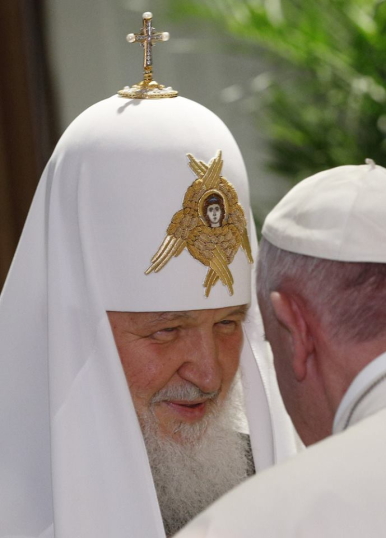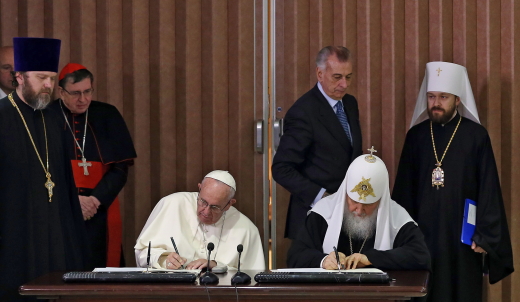 The Airport of Havana, Cuba, hosted the first meeting in history between the Bishop of Rome and the Patriarch of Moscow, on February 12, 2016. It was a fraternal encounter “between bishops’ that “gave an opportunity to listen and understand each other’s positions” said Patriarch Kirill at the conclusion of the meeting. Among the common concerns were the desire for peace and the defence of persecuted Christians around the world. “I felt the consolation of the Holy Spirit in this dialogue,” Pope Francis remarked, with the prospect of “a series of initiatives” to be carried forward together. “We are not competitors but brothers, and this concept must guide all our mutual actions as well as those directed to the outside world,” states the Joint Declaration that was signed by the Pope and the Patriarch. The declaration calls for common efforts between Roman Catholic and Orthodox Christians, and overcoming the historic divergences we have inherited, responding together to the challenges of today’s world. Christians are now victims of persecutions and violence in Syria, Iraq and other Middle East countries. Other challenges include the fight against terrorism, interreligious dialogue, European integration and respect for religious identities. The document also mentions social and ethical topics, with “pastoral” concern, as Pope Francis stressed while speaking with journalists on the flight between Cuba and Mexico: poverty, the breakdown of the family, the right to life (abortion, euthanasia and assisted reproduction), young people and peace in Ukraine. Much of the future of humanity will depend on our capacity to give shared witness to the Spirit of truth in these difficult times,” the document goes on to say.
The Airport of Havana, Cuba, hosted the first meeting in history between the Bishop of Rome and the Patriarch of Moscow, on February 12, 2016. It was a fraternal encounter “between bishops’ that “gave an opportunity to listen and understand each other’s positions” said Patriarch Kirill at the conclusion of the meeting. Among the common concerns were the desire for peace and the defence of persecuted Christians around the world. “I felt the consolation of the Holy Spirit in this dialogue,” Pope Francis remarked, with the prospect of “a series of initiatives” to be carried forward together. “We are not competitors but brothers, and this concept must guide all our mutual actions as well as those directed to the outside world,” states the Joint Declaration that was signed by the Pope and the Patriarch. The declaration calls for common efforts between Roman Catholic and Orthodox Christians, and overcoming the historic divergences we have inherited, responding together to the challenges of today’s world. Christians are now victims of persecutions and violence in Syria, Iraq and other Middle East countries. Other challenges include the fight against terrorism, interreligious dialogue, European integration and respect for religious identities. The document also mentions social and ethical topics, with “pastoral” concern, as Pope Francis stressed while speaking with journalists on the flight between Cuba and Mexico: poverty, the breakdown of the family, the right to life (abortion, euthanasia and assisted reproduction), young people and peace in Ukraine. Much of the future of humanity will depend on our capacity to give shared witness to the Spirit of truth in these difficult times,” the document goes on to say.  “Here in Moscow there is also the feeling that this was an important and historic meeting” writes focolarina Anna Gloria from the focolare in Moscow. The mass media are talking about it a lot. Bishop Paolo Pezzi invited everyone to the Cathedral of the Immaculate Conception to pray for unity. It was quite beautiful. There were Catholics and Orthodox from several movements and communities. Everyone feels that an important step towards unity has been taken.” Despite recent tensions between Moscow and Rome, the Russian Orthodox Church has a long history of seeking the reconciliation of the divided Christian churches. Father Hyacinthe Destivelle said so during an interview with the Vatican Radio. He is in charge of relations with the Slavic Orthodox Churches at the Pontifical Council for Christian Unity and was in Cuba for the meeting. Father Destivelle also explained that “the Russian Orthodox Church is fifth in the traditional order of authority among the 14 autocephalous Orthodox Churches. First position belongs to the Patriarchate of Constantinople, with a primacy of honour. It has a special relationship with the Holy See.” “The significance of the meeting between Pope Francis and Patriarch Kirill can also be seen in light of history with the Russian Orthodox Church,” where it “can act as a bridge between East and West.” Father Destivelle also gave other examples of how the Russian Orthodox Church was an active pioneer in ecumenical relations. It was the first Church to send observers during the Second Vatican Council. During their private meeting, Pope Francis and Patriarch Kirill also discussed the upcoming Pan-Orthodox Council scheduled for June 2016 in Crete. It will ”gather all the Orthodox churches for an Orthodox Synod,” Dr. Dimitrios Keramidas recently explained at an ecumenical school of the Focolare Movement, “this is not an event that is inserted into ecclesial life, but rather the official manifestation of the communional essence of the Church, the on-going and uninterrupted journey of the People of God.” It is a journey towards unity.
“Here in Moscow there is also the feeling that this was an important and historic meeting” writes focolarina Anna Gloria from the focolare in Moscow. The mass media are talking about it a lot. Bishop Paolo Pezzi invited everyone to the Cathedral of the Immaculate Conception to pray for unity. It was quite beautiful. There were Catholics and Orthodox from several movements and communities. Everyone feels that an important step towards unity has been taken.” Despite recent tensions between Moscow and Rome, the Russian Orthodox Church has a long history of seeking the reconciliation of the divided Christian churches. Father Hyacinthe Destivelle said so during an interview with the Vatican Radio. He is in charge of relations with the Slavic Orthodox Churches at the Pontifical Council for Christian Unity and was in Cuba for the meeting. Father Destivelle also explained that “the Russian Orthodox Church is fifth in the traditional order of authority among the 14 autocephalous Orthodox Churches. First position belongs to the Patriarchate of Constantinople, with a primacy of honour. It has a special relationship with the Holy See.” “The significance of the meeting between Pope Francis and Patriarch Kirill can also be seen in light of history with the Russian Orthodox Church,” where it “can act as a bridge between East and West.” Father Destivelle also gave other examples of how the Russian Orthodox Church was an active pioneer in ecumenical relations. It was the first Church to send observers during the Second Vatican Council. During their private meeting, Pope Francis and Patriarch Kirill also discussed the upcoming Pan-Orthodox Council scheduled for June 2016 in Crete. It will ”gather all the Orthodox churches for an Orthodox Synod,” Dr. Dimitrios Keramidas recently explained at an ecumenical school of the Focolare Movement, “this is not an event that is inserted into ecclesial life, but rather the official manifestation of the communional essence of the Church, the on-going and uninterrupted journey of the People of God.” It is a journey towards unity.
Be transformed by God’s presence
Be transformed by God’s presence




0 Comments